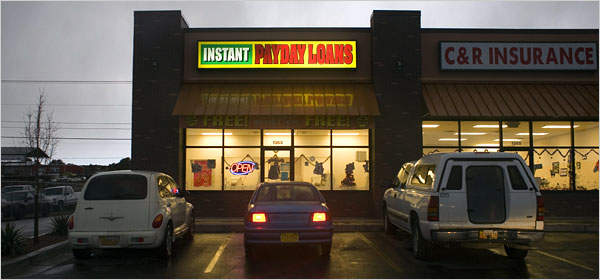| Want to send this page or a link to a friend? Click on mail at the top of this window. |
More Special Reports |
| Posted December 24, 2006 |
Seductively Easy, 'Payday Loans' Often Snowball |
 |
|
Photographs, Rick Scibelli Jr. for The New York Times |
|
| The payday loan practice is rampant and unregulated in New Mexico. Gallup, a town of 22,000, is the site of at least 40 lending shops. |
By ERIK ECKHOLM |
GALLUP, N.M., Dec. 20 — Earl Milford put up an artificial Christmas tree in the wooden house on the Navajo reservation near here that he shares with a son and daughter-in-law and their two little girls.
But money is scarce and so are presents. “It’s all right,” he said, “they know I love them.” Mr. Milford is chronically broke because each month, in what he calls “my ritual,” he travels 30 miles to Gallup and visits 16 storefront money-lending shops.
Mr. Milford, who is 59 and receives a civil service pension and veteran’s disability benefits, doles out some $1,500 monthly to the lenders just to cover the interest on what he had intended several years ago to be short-term “payday loans.”
Mr. Milford said he had stopped taking out new loans, but many other residents of the Gallup area and countless more people across the country are visiting payday lenders this month, places with names like Cash Cow, Payday Plus and Fast Buck, to get advances of a few hundred dollars to help with holiday expenses.
While such lending is effectively banned in 11 states, including New York, through usury or other laws, it is flourishing in 39 others. The practice is unusually rampant and unregulated in New Mexico, where it has become a contentious political issue. The Center for Responsible Lending, a private consumer group, calculates that nationally payday loans totaled at least $28 billion in 2005, doubling in five years.
The loans are quick and easy. Customers are usually required to leave a predated personal check that the lender can cash on the next payday, two or four weeks later. They must show a pay stub or proof of regular income, like Social Security, but there is no credit check, which leads to some defaults but, more often, continued extension of the loan, with repeated fees.
In many states, including New Mexico, lenders also make no effort to see if customers have borrowed elsewhere, which is how Mr. Milford could take out so many loans at once. If they repay on time, borrowers pay fees ranging from $15 per $100 borrowed in some states to, in New Mexico, often $20 or more per $100, which translates into an annualized interest rate, for a two-week loan, of 520 percent or more.
In September, Congress, responding to complaints that military personnel were the targets of “predatory lenders,” imposed a limit of 36 percent annual interest on loans to military families. The law will take effect next October and is expected to choke off payday lending to this group because, lenders say, the fees they could charge for a two-week loan would be negligible, little more than 10 cents per day, said Don Gayhardt, president of the Dollar Financial Corporation, which owns a national chain of lenders called Money Marts.
 |
| Mr. Milford, who is on a fixed income, with a ledger of his loans. |
The new law will have little impact on the larger practice because military families account for only a tiny share of payday lending, which lenders defend as meeting a need of low-income workers.
Mr. Gayhardt said the industry had prospered because more people worked in modestly paying service-sector jobs, and in a pinch they found payday loans cheaper and more convenient than bouncing checks, paying late fees on credit cards or having their utilities cut off.
Mr. Gayhardt, who is also a board member of the Community Financial Services Association of America, a trade group that represents about 60 percent of payday lenders, said the frequency of extended rollovers and huge payments was exaggerated by critics.
He said the association supported “fair regulations,” including a cap on two-week fees in the range of $15 to $17 per $100, a level now mandated in several states, including Florida, Illinois and Minnesota. This translates into effective fees of about a dollar a day for those who repay on time, which he said was reasonable given the risks and costs of business.
“We want to treat customers well so they’ll come back,” Mr. Gayhardt said in a telephone interview from his headquarters near Philadelphia.
Even so, higher fees and sorry stories are not hard to find. Payday lenders have proliferated over the last 15 years, including here in Gallup, a scenic but impoverished town of 22,000 with a mix of Indian, Hispanic and white residents and a striking density of storefront lenders.
At least 40 lending shops have sprung up, scattered among touristy “trading posts,” venerable pawn shops and restaurants along the main street (old Route 66) and with as many as three crowding into every surrounding strip mall.
“Payday lending just keeps growing, and it just keeps sucking our community dry,” said Ralph Richards, a co-owner of Earl’s, Gallup’s largest and busiest restaurant.
Mr. Richards sees the impact among his 120 employees, mainly Navajo, some of whom become trapped by payday loans they cannot repay and, he said, “develop a sense of hopelessness.”
In one indication of how common the problems are, his restaurant alone gets 10 to 15 calls each day from payday lenders trying to collect overdue fees from his workers, Mr. Richards said. At any one time, under court order, he must garnishee the wages of about a dozen of his workers to repay such lenders.
 |
| Earl Milford, at home with his granddaughter, pays $1,500 a month just to cover the interest on what he had intended to be short-term loans. |
The biggest problem, consumer advocates say, and the biggest source of profits to lenders, is that too many customers find, like Mr. Milford, that they must “roll over” the loans, repaying the same fee each month until they can muster the original loan amount.
Over several months, they can easily spend far more on fees than they ever received in cash and may end up by borrowing from multiple sites to pay off others.
One restaurant cashier here, Pat T., a 39-year-old mother of five who did not want to embarrass her family by giving her full name, said she had borrowed $200 last year when she could not pay an electric bill because “it was so easy to do.” It took her six months to repay the $200, and by then, she had paid $510 in fees.
Efforts to regulate the industry in New Mexico bogged down this year. Lenders hired lobbyists to push for mild rules, and consumer advocates were split between those who wanted to virtually shut down the industry and others, including Gov. Bill Richardson, who promoted rules like mandatory reporting of loans, limits on fees and rollovers, and an option for borrowers to convert loans to longer-term installment plans.
Last summer, after legislation failed, Mr. Richardson issued regulations along those lines, but a court declared them illegal. The state has appealed.
The issue will be raised again in January’s legislative session. Lt. Gov. Diane D. Denish, who described payday loans as “stripping the wealth out of the low-income community,” said she feared that the same political stalemate would prevail. In the meantime, Ms. Denish and many others say, efforts are needed to develop private alternatives to payday loans.
In an initiative that has attracted wide attention here, the First Financial Credit Union will offer an alternative payday loan plan, with a fee of $12 per $100 borrowed and a novel chance for customers to start building assets.
Customers who attend classes in financial planning and agree not to seek loans elsewhere will have 80 percent of their loan fees returned to them and put into their own personal savings account, said Ben Heyward, chief executive of the credit union.
“We’ll lick the payday lending problem when people learn how to save,” Mr. Heyward said. “When they kick the short-term loan addiction.”
In the meantime, there is no shortage of borrowers.
Debbie Tang, a single mother of two, took out three $200 loans, with total fees of $180 per month, when her child support payments did not arrive last month or this month. Without a credit history to get a bank loan, Ms. Tang said she felt she had little choice but to visit payday lenders to pay the electric and gas bills until her grants for her nursing studies arrive in January.
Like Mr. Milford, Ms. Tang has put up a Christmas tree but has no presents underneath. She recently broke the hard news to her 10-year-old daughter and 8-year-old son: “We’ll just put Christmas off for a month,” she said.
Copyright 2006 The New York Times Company. Reprinted from The New York Times, National, of Saturday, December 23, 2006.
| Wehaitians.com, the scholarly journal of democracy and human rights |
| More from wehaitians.com |